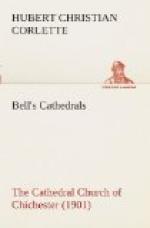[31] Stephens, p. 49.
#Seffrid Pelochin#, or #d’Escures# (1125-1147), ceded to the king’s aggression the rights and privileges Ralph had gained. He was obliged to vacate the see in 1145, [an]d returned to Glastonbury, where he had been abbot before he was made bishop. His name figures in the list which Roger of Hoveden gives in his chronicle, as one among the bishops who were at the Council of London in 1129.
#Hilary# (1147-1169) was a bishop who was before all things an ecclesiastic. To Ralph Luffa’s foundation of the dean’s office he added those of the chancellor and treasurer, if not also, as is supposed, that of the praecentor. With Hilary began the traditional post of confessor to the queen of the realm. Stephen had given him this office, and at the same time added to the privilege a perpetual chaplaincy in connection with the castle at Pevensey.
The letters from Popes Eugenius and Alexander III., which confirmed the possessions held by the see and guaranteed a papal protection of the church in Chichester, are among the collection in the cathedral library. The properties these deeds acknowledge include that portion of the city—one fourth—in which the close was situated; and within this area were comprised the church itself, the episcopal palace, and the residences of the canons. The original grant of this land was made by William, Earl of Arundel, in 1147, who bestowed it among other things as compensation “for the damages which I once did to the same church.” Hilary was Bishop of Chichester during that historic period when Becket opposed Henry II. He attempted, like the rest of the bishops, to heal the breach; and Tennyson, in “Becket,” adopting a phrase he used, makes him say to his Primate, “Hath not thine ambition set the Church this day between the hammer and the anvil ... fealty to the King, obedience to thyself?” He went to Sens, to plead as an advocate on the king’s behalf before Pope Alexander III. and the French king. The result of this meeting was that England was placed under the ban of excommunication. But Henry replied by declaring that the property of all who acted upon it should be confiscated and themselves banished. The bishop was involved also in a local contest with the Abbot of Battle, who refused to consider himself subject to his episcopal jurisdiction.
After Hilary’s death in 1169 the revenues of the see were for four years appropriated to his own uses by the king, who late in the year 1173 appointed #John Greenford# (1174-1180), who was Dean of Chichester, to the vacancy. The bishop-elect was not consecrated until, in 1174, he, with three more nominated about the same time, had done penance before Becket’s tomb at Canterbury. Little is known of him except that he attended some ecclesiastical councils.
The episcopate of #Seffrid II.# (1180-1204) introduces an important period of activity, during which great alterations were made in the fabric of the cathedral.




